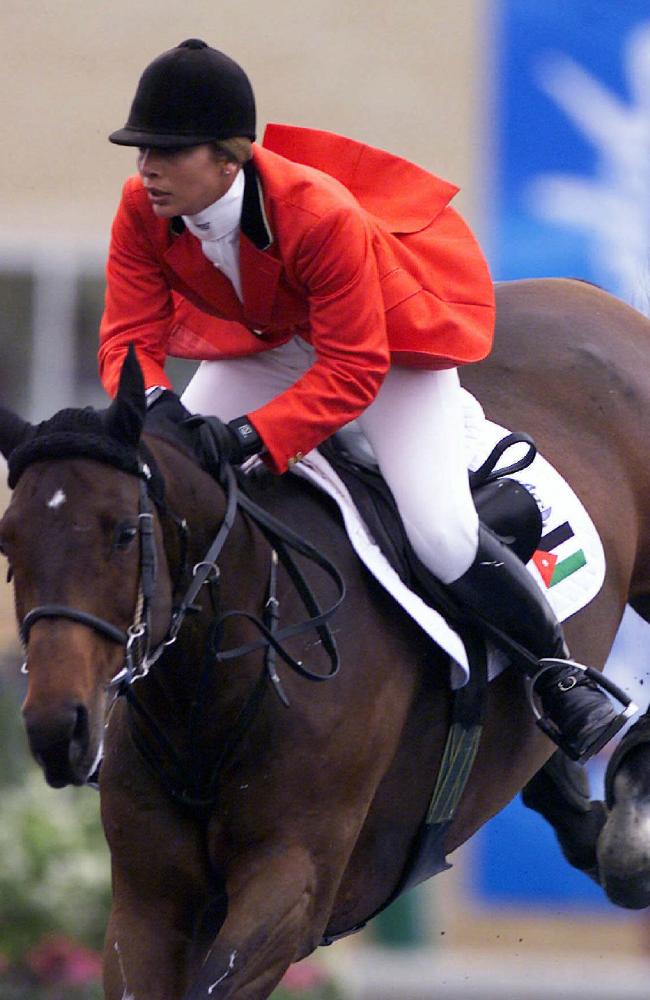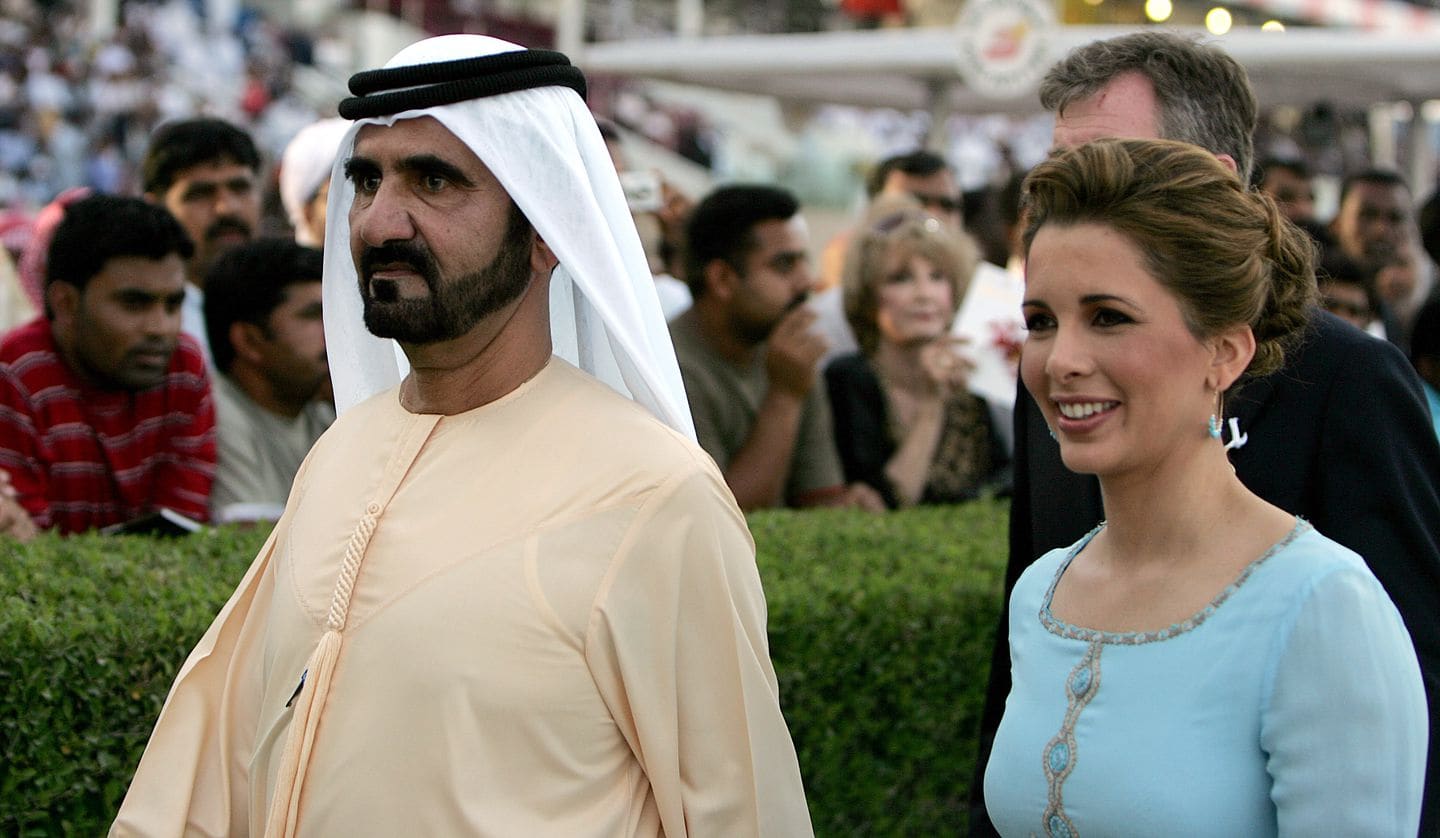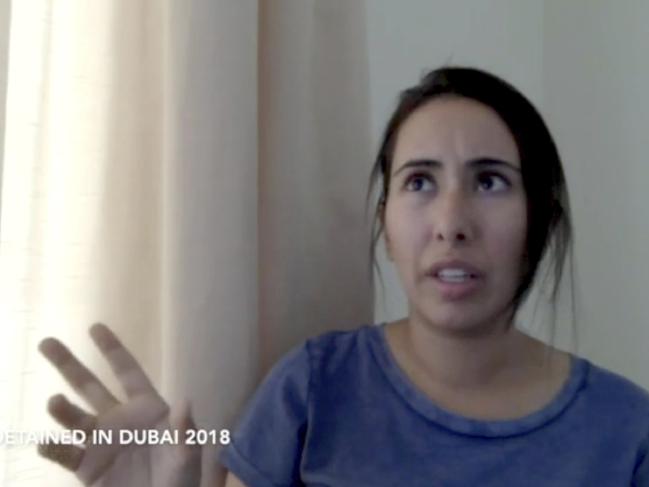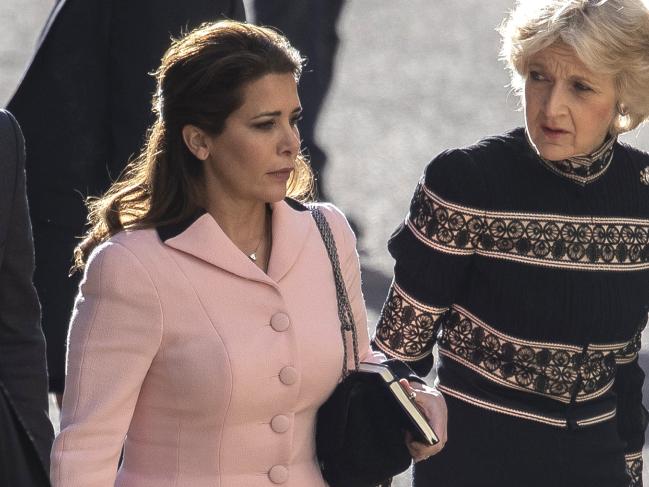Princess Haya made headlines when she left Dubai’s billionaire ruler – now a new report has offered tantalising clues about why she fled.
On what is arguably the most expensive street in the world, one house stands out.
In among the ambassadorial residences and stately Georgian mansions that line Kensington Park Gardens, one particular red brick home has a series of unusual sculpted stone falcons perched on the wall, standing sentry at the entrance. Wander past and you will, at times, notice a gaggle of imposing security staff glaring at passers-by.
This is the new home of Princess Haya, the woman at the centre of one of the biggest divorces in modern history after her shock split from Emirati leader sheik Mohammed al Maktoum, whose worth is put somewhere between $7.5 billion and $17 billion.
In July this year it was first reported that Haya had fled Dubai with the couple’s two children, first travelling to Germany and then settling into her $160 million Kensington home.
News of Princess Haya and sheik Mohammed’s split caused shockwaves and has set off an epic legal showdown that is playing out in a London courtroom.
This week, Haya was photographed arriving at the UK High Court with her high-powered lawyer Baroness Shackleton, the first time the 45-year-old royal has been seen in public in months. (Sheik Mohammed did not appear in court.)
Haya’s re-emergence also comes as Vanity Fair has released an explosive story about her life in Dubai that offers tantalising clues about why the high-profile princess might have decided to escape her gilt royal life.

‘YOU’RE ESSENTIALLY A PRISONER’
Princess Haya did not just marry into royalty, she was born into it. Her father was King Hussein of Jordan and her mother his third wife, Princess Alia. (The current King Abdullah II is her half-brother.) While her mother tragically died in a helicopter crash when she was only two years old, Haya’s childhood was one of not only extreme wealth but love.
“Whenever we weren’t in school, we’d go to the office with (King Hussein), and weekends were ours,” she told society bible Tatler in 2017. “He’d take us driving, take us round the country, show us places that he’d grown up seeing, talk to us about his experiences. No nannies – he’d take us on our own and we’d just be with Dad.”
Tellingly, the last photo that Haya shared to her official Instagram account is of herself dancing with her father.
Educated in Britain, including earning a degree from Oxford University, Haya made history when she became the first Arab woman to qualify for and compete in the equestrian world championship and later at the Sydney Olympics.

Here was the face of a new type of Middle Eastern woman – ambitious and independent – an image that was only bolstered further when she became the first woman in Jordan to get a truck licence. (A committed supporter of the World Food Program, she wanted to be able to ferry supplies herself.)
MARRYING A PRINCE
In the early 2000s, Haya crossed paths with sheik Mohammed bin Rashid al-Maktoum at a horse race in Spain. When the couple met he already had five wives and more than two dozen children. Still, theirs was a love match rather than an arranged marriage. In 2004 they wed and went on to welcome daughter Sheikha Jalila in 2007 and son sheik Zayed in 2012. (It is believed that sheik Mohammed has fathered 30 children.)
Haya and Mohammed’s union was held up as an exemplar of a rapidly modernising Middle East. As his “public” wife, Haya accompanied her husband abroad, annually appearing at Ascot together along with their close friend, the Queen.

Joe Little, managing editor of Majesty magazine, flew to Dubai several years ago to interview Haya. He paints a picture of her as a gracious and kind woman who was passionate about supporting her husband’s work.
“She greeted me like an old friend rather than a journalist, which was nice given that we’d met only once before, in Ireland, some 20 years earlier,” he tells news.com.au. “She’s warm and welcoming, unlike some other royals who can be a bit grand and intimidating. I was seeing her at home, of course, and perhaps that’s why she was so relaxed.
“We covered many topics and she was very forthcoming, particularly about the humanitarian projects her husband sheik Mohammed was involved with and about which she was so passionate.”
PLAYING BY THE RULES
However, while Dubai’s image might be of a desert playground, all five-star hotels, sandy beaches and modern shopping malls, the reality for women, even royal women, stands in stark contrast to the glittering patina.
In January this year, sheik Mohammed awarded four gender equality awards – all to men. (Twitter users had a field day ridiculing the move.) In 2017, an engaged (but not married) couple were arrested for unlawful sex after they discovered the woman was pregnant. Human Rights Watch’s 2019 report states “UAE law permits domestic violence.” There is no indication domestic violence was a factor in Haya’s marriage.
Speaking to Vanity Fair this week, an Arab dissident told the magazine: “You have the fancy title of being a princess, and of course you have people waiting on you (hand and foot), but you’re essentially a prisoner. You’re not supposed to socialise. You don’t have a normal life.”
A source with knowledge of Dubai royalty has said: “I think Princess Haya falls into the category of the type of princess who learned that once you marry into the family, you have to play by their rules. And their rules include self-preservation at all costs.”

PRINCESS MYSTERY
While no definitive answer has been given as to why Haya, after 15 years of marriage, suddenly fled her adopted homeland, one widely circulated theory relates to two of her stepdaughters.
In 2000, Princess Shamsa fled sheik Mohammed’s $150 million British country estate. The Guardian has reported that weeks later, she was grabbed off the street in Cambridge and taken back to the UAE. Earlier this year, Tiina Jauhiainen a Finnish woman who has spent time with the Emirati royal family, told news.com.au that Shamsa had allegedly been tortured, jailed and drugged.
Then, in 2018, Shamsa’s half-sister Princess Latifa staged her own daring escape. Along with her friend Jauhiainen, the duo evaded her bodyguards, drove to Oman where they boarded jet skis for a harrowing 40km journey before rendezvousing with former French navy officer Hervé Jaubert aboard his yacht in international waters.
Days later, off the coast of Goa in India, commandos boarded their vessel and took everyone on-board back to Dubai. While Jauhiainen and the crew were eventually released from a Dubai jail, Latifa’s wellbeing and whereabouts have been an international mystery ever since.
In a video shot before her daring flight, Latifa spoke about her life in Dubai, including being allegedly tortured after a previous escape attempt: “Basically, one guy was holding me while the other guy was beating me and they did that repeatedly,” Latifa says.
She also said: “If you are watching this video, it’s not such a good thing. Either I’m dead or in a very, very bad situation.”

Both sisters are still being held against their will, Jauhiainen alleged to news.com.au in August this year.
Friends of Haya, in July this year, told the Evening Standard that she had left Dubai “in fear of her life”.
UNANSWERED QUESTIONS
While Haya’s motives for leaving Dubai remain shrouded in mystery, there are a couple of interesting facets to this story that have recently come to light. Vanity Fair has reported that Haya left with about $58 million and that “others wonder if she and sheik Mohammed hadn’t actually worked out their separation before she departed”.
Also, Dubai has more surveillance cameras than anywhere else on the planet. How Haya could have made her plans and escaped without her husband knowing remains unanswered.
THE STEEL MAGNOLIA
After arriving in London in July, Haya launched legal action in the UK seeking sole custody of her two children with sheik Mohammed. (In a joint statement at the time, Princess Haya and sheik Mohammed said: “These proceedings are concerned with the welfare of the two children of their marriage and do not concern divorce or finances.” Her team then applied for court orders to protect her children from forced marriage and a non-molestation order.
While very little is known about what is happening behind closed doors – there are strict reporting rules in place – both sides have turned to superstar legal teams to make their case.
Haya is being represented by Baroness Fiona Shackleton, who acted for Prince Charles during his 1996 divorce from Diana, Princess of Wales. Dubbed the “Steel Magnolia”, Lady Shackleton’s roster of clients includes a raft of royals. She is the solicitor for the Duke of Cambridge and the Duke of Sussex and also represented Prince Andrew and Paul McCartney during their respective divorces.
Across the aisle, Helen Ward, who acted for Guy Ritchie during his split from Madonna, is representing sheik Mohammed.

In the wake of sheik Mohammed and Princess Haya’s split, the ruler took to Instagram to share a poem he had written called “You Lived and You Died”. In it he writes, “You betrayer, you betrayed the most precious trust, and your game has been revealed … You no longer have any place with me/ Go to who you have been busy with!/ And let this be good for you; I don’t care if you live or you die.”
On Tuesday this week, the day of the first preliminary hearing in their custody case, sheik Mohammed again took to social media with a new poem called “Swords of the Sufferer”.
“Glory to his family,” the translation reads. “He has to return the vengeance … and solve the most difficult things.”
Daniela Elser is a royal expert and writer with 15 years’ experience working with a number of Australia’s biggest media titles.





